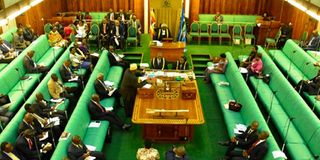Anglicans dominate 10th Parliament

Parliament during plenary recently
What you need to know:
- Saturday Monitor’s Isaac Imaka looks at the religious composition of the 10th Parliament as whether religious affiliation was and or is an issue in parliamentary politics, especially in campaigns.
- As the country headed to the polls both in 2011 and early this year, religious leaders came out calling for peaceful elections. None, however, called for a particular way of voting.
- The presentation is in contrast with the 2014 census report, which shows that there are more Catholics nationally, with 39.3 per cent, followed by Anglicans at 32 per cent and Muslims at 13.7 per cent.
Faith matters. Saturday Monitor’s Isaac Imaka looks at the religious composition of the 10th Parliament as whether religious affiliation was and or is an issue in parliamentary politics, especially in campaigns.
During the campaign of 1962, the Democratic Party (DP) was popularly known as “Dini ya Papa” (Religion of the Pope) and the Uganda Peoples Congress (UPC) as United Protestants of Canterbury.
Giving politics a religious touch was not new, even by then.
As early as 1890, Catholics, Protestants and Muslims in Buganda had formed themselves into indigenous political institutions. This pattern, F B Welbourn writes in his book: Religion and Politics in Uganda: 1952-62, with all its consequences, was repeated throughout Uganda— and it has been part of politics ever since.
According to an analysis of 408 current legislators out of 431, who submitted their profiles to the clerk’s office, Parliament has more Anglicans than any other religions.
According to the data, there are 166 Anglicans, 155 Catholics, and 43 Pentecostals. The Muslims come in at a distant fourth with 26 members, followed by Seventh Day Adventists and Buddhists at two and one, respectively. Six legislators registered their religion in category “none”.
The presentation is in contrast with the 2014 census report, which shows that there are more Catholics nationally, with 39.3 per cent, followed by Anglicans at 32 per cent and Muslims at 13.7 per cent.
The Parliament statistics, somehow, feed in the legislators’ argument that unlike in Uganda’s politics of yore, religion’s influence on who the people vote for is very low.
“People look at merit and what you promise them in your manifesto,” said former Ntenjeru South MP, Patrick Nsanja, who is currently campaigning to represent Uganda in the East African Legislative Assembly. “What matters most also is whether you are a born of that area where you are campaigning from and whether people see you as their own son or daughter.”
Bugabula County South MP Maurice Kibalya shares similar sentiments as one who comes from a constituency previously held by a Muslim.
“Muslims in my constituency are less than 10 per cent yet the constituency was represented by a Muslim for 15 years.
“If religion mattered that much, my predecessor wouldn’t have managed to be an MP for all those years because we are many Anglicans,” he said.
Ayivu County MP Bernard Atiku (Ind), who put “none” in his religion category, however, says religion is one of the issues he has to deal with when campaigning.
“It is not one of the dominant factors but it is very important how the political players address it,” he said. “It depends on the constituency and the number per religion.
When he took power in 1986, President Museveni ordered that religious leaders keep out of politics because religion took a large share of the blame for the political chaos that engulfed the country from independence.
Religion has, however, been seen coming up in politics, especially when there is political and or economic uncertainty in the country with religious leaders taking to the podium to guide the country and sometimes call for certain actions from the central government.
As the country headed to the polls both in 2011 and early this year, religious leaders came out calling for peaceful elections. None, however, called for a particular way of voting.
Ms Enid Mirembe, a Kampala voter and an Arts student at Makerere University, says her vote is won by competence and not religion.
“Someone could be a Muslim but very good at delivering yet one could be a Christina and fail to deliver,” she said. “Service delivery is more important to me than one’s religion.”



